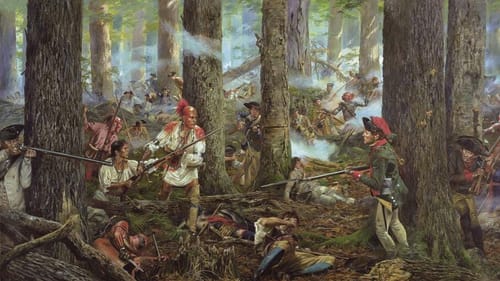Stay in the Loop
BSR publishes on a weekly schedule, with an email newsletter every Wednesday and Thursday morning. There’s no paywall, and subscribing is always free.
Glory, grit, and agony
The Museum of the American Revolution presents Liberty: Don Troiani’s Paintings of the Revolutionary War

We often sanitize the American War for Independence (1775-1783) and limn it as a time of valor, noble aims, and heroism. To be sure, people on all sides of the conflict displayed those traits. But the current exhibition at the Museum of the American Revolution provides a more rounded visual assessment of both that time and the sacrifices on all sides.
Showing the dubious glory of war in all its grit and agony, Liberty: Don Troiani’s Paintings of the Revolutionary War is a lifetime’s work, both a striking retrospective and an eye-opening reconsideration of that seminal struggle.
Familiar work, first assembly
Don Troiani (b. 1949) works in the venerable tradition of illustrative painting. The Brandywine Valley is an American cradle of this heritage, but the artist sees himself more fully in the tradition of 19th-century masters like the great French painter J.L.E. Meissonier, best known for his Napoleonic-era images. Troiani, who was born in New York City and works from his Connecticut studio, studied at Philadelphia’s Pennsylvania Academy of the Fine Arts and the Art Students League in New York.
Museum curator Matthew Skic presents these 46 definitive works in a cogent and beautifully mounted chronology that follows the timeline of the war. Troiani’s work is likely familiar; it’s been seen extensively and for years in magazines and books, but this is the first major exhibition that assembles the prolific artist’s originals.
The paintings
With few exceptions, these are large works populated with a plethora of people, all fully realized. The detail is striking, with individualized characterizations—faces, emotions, clothing, body language—that arrest the viewer and call for detailed observation of each painting. Troiani’s mastery of light is evident throughout, especially in Royal Regiment of Artillery, 1775. This 2013 work in oil, watercolor, and gouache strikingly contrasts the precision of the British troops with the colonists’ extempore militarism.
The Oneida at the Battle of Oriskany, August 6, 1777 is a reminder that the war’s northern theater also fomented a bitter civil war among the Iroquois Nation. Morgan’s Rifles depicts that determined cadre of Virginia frontiersmen. And there are moving individual portrayals of treachery (Nathan Hale, September 22, 1776) and bravery (Molly Pitcher, Battle of Monmouth, 1778).
The museum also commissioned Brave Men as Ever Fought (2020), a new work showing soldiers marching on Chestnut Street in Philadelphia, headed for Yorktown. They are closely watched by 15-year-old James Forten, surprised to see men of color (like himself) in the troops. He kept a diary, and based on his observations, on November 11, the museum will debut Meet James Forten, a theatrical first-person presentation (both onsite and virtual) written by playwright Marissa Kennedy and featuring Nathan Alford-Tate.

Painterly skill, intellectual immersion
Troiani visits the battlefields he portrays and paints almost exclusively from life, utilizing models and working frequently with historical reenactors. The works’ immediacy is due not only to his painterly skill but also to a deep intellectual immersion in history. The artist is a serious collector of militaria (uniforms, equipage, insignia, and weapons) who often works from his own collection, including a library of more than 3,000 volumes. A sought-after consultant, Troiani has worked with media and productions including the feature film Cold Mountain, A&E’s The American Revolution, and shows for The History Channel.
As he did in the museum’s 2019 exhibition about soldier-artist Richard St. George, Skic meshes art and milieu, setting these contemporary paintings in historical context. Troiani’s works are paired with more than 40 artifacts that inspired or illuminated them—a canteen, pieces of uniforms, a cannonball, and one of the first published images of the war, an engraving of the Boston Massacre by Paul Revere (who was not only a soldier and silversmith).
Seeking his own truth
There’s a substantial slate of programs for learners of every age, and the museum offers a handsome 130-page illustrated publication filled with historical riches—text by Skic, artist comments on his paintings, essays by established historians, photographs of models at work, and plates of every image in the exhibition.
This work is markedly different from the abstractions that often define the “convention” of contemporary art, but Troiani seeks his own truth, working at the highest level of artistic practice. He has dedicated much of his career to transforming the modern understanding of what the Revolutionary War truly looked like, an exploration also underway concurrently (via a quite different medium) in the musical Hamilton at the Academy of Music.
Liberty runs through next summer, and in this comprehensive and striking exhibition, the artist is quoted as seeking “to document the great scenes of American history for the privilege of living here.” It’s also a privilege to see and study this body of illuminating work from a man widely considered America’s foremost historical military artist.
What, When, Where
Liberty: Don Troiani’s Paintings of the Revolutionary War. $13-$19. Through Monday, September 5, 2022, at the Museum of the American Revolution, 101 South 3rd Street, Philadelphia. (877) 740-1776 or amrevmuseum.org.
The museum requires all guests over the age of five to wear a face mask regardless of Covid-19 vaccination status. Timed tickets limit the number of people in the building. Visit the museum’s health and safety page for more info.
Accessibility
The Museum of the American Revolution is a wheelchair-accessible venue with a variety of accommodations for guests with disabilities. Visit the museum’s accessibility page for more info.
Sign up for our newsletter
All of the week's new articles, all in one place. Sign up for the free weekly BSR newsletters, and don't miss a conversation.
 Gail Obenreder
Gail Obenreder